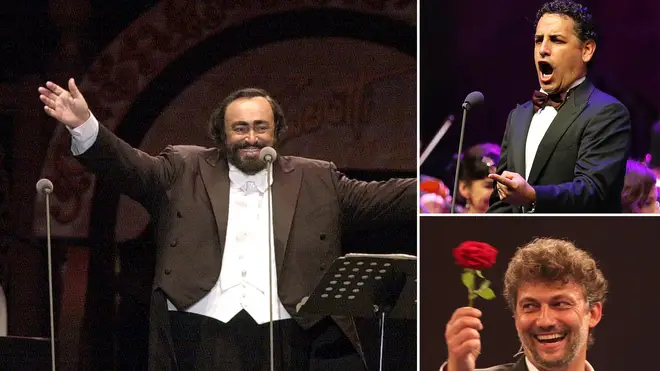On Air Now
Relaxing Evenings with Zeb Soanes 7pm - 10pm
24 May 2018, 13:00 | Updated: 24 May 2018, 16:15

Tenors are the golden boys of the singing world, and generations of composers have written some of their greatest music to show off what these superstars of the opera stage can do
Traditionally the role of the hero is sung by a tenor and supporting male roles by a baritone or bass. This might seem unusual given that lower speaking voices tend to be associated with manliness and bravery, but just listen to some of our top picks for the tenor voice and we guarantee you’ll fall in love...
This unusual aria by Donizetti begins with a bassoon solo, perhaps to characterise the ungainly Nemorino, a rustic farm boy who buys a love potion to win the heart of his unrequited love, Adina.
Despite the happy subject matter, (Adina has drunk the potion and it appears to have worked!) the aria is written in a minor key, which implies that the game is not yet won... With sustained lines throughout, this aria is not for the faint-hearted:

Juan Diego Flórez: Una Furtiva Lagrima
Probably the most famous opera aria ever written, this is full-on, romantic Puccini at its best. But the story which surrounds it in the opera is rather sinister.
The lyrics translate as ‘None shall sleep’ – because the princess Turandot has threatened to kill all of her subjects unless they find out the name of her suitor by dawn!
‘Nessun Dorma’ found mainstream fame after Pavarotti performed it with ‘The Three Tenors’ at the World Cup in Italy in 1990, and his recording of the aria is still regarded as one of the best.

LUCIANO PAVAROTTI: Nessun dorma! GIACOMO PUCCINI Turandot
The second book of Schubert’s song cycle Winterreise was finished shortly before his death in 1828, and it is the work of a man coming to terms with his own death.
From his mid-twenties, Schubert was well aware that his time on earth was limited. His body was wracked by the second stage of syphilis, and as the disease progressed over his final four years of life, he wrote furiously – never knowing which day would be his last. One of his most desolate images is of the bare-footed organ-grinder with a fixed grimace in Die Leiermann, (The Hurdy-Gurdy Man):

Schubert - Der Leiermann - Thomas Quasthoff / Daniel Barenboim
This piece is often attributed to J.S. Bach, (it even has its own BWV number: 508) but it was originally by Gottfried Heinrich Stölzel, a contemporary of Bach who was 15 years his senior. It was written down by Bach in the Anna Magdalena notebook, and Bach probably harmonised a version for voice and keyboard. It has been transposed many times so that it can be performed by any voice part, but this version by Placido Domingo and Sissel Kyrkjebø is heavenly:

Bist du bei mir - Domingo & Sissel
Translated as ‘women are fickle’, ‘La Donne è Mobile’ is a comic aria from Rigoletto by Verdi which has achieved its own independent fame through being used in countless TV adverts and films.
Its success lies in its incredibly catchy melody. In fact, Verdi was so certain that the tune would become a hit that he forbade his singers from humming or whistling it outside rehearsals, to avoid it getting ‘leaked’ before the premiere. Here is our favourite version, sung by Jonas Kaufmann:

Jonas Kaufmann La Donna e Mobile
Rodolfo, the poet and tenor star of Puccini’s opera La Bohéme, has fallen in love with Mimì. He takes her cold hand and tells her about his life, singing ‘Che gelida manina’, which translates as ‘What a cold little hand’.
We’re not convinced it’s the best chat-up line in the book, but it’s definitely one of the strongest tenor pieces out there.

La Boheme - Pavarotti- "Che gelida manina" Fiamma Izzo d' Amico "Si, mi chiamano Mimi"
The title, ‘Ah! mes amis, quel jour de fête!’ is a bit of a mouthful, so this behemoth of an aria is affectionately nicknamed, ‘Pour mon âme’.
It is regarded as one of the most difficult arias in the tenor repertoire, and it’s not difficult to see (or hear) why. The piece features no fewer than nine high Cs, and to make it even more difficult, it’s quite early on in the first half of the opera, giving the tenor less time to warm up their voice.
This is one of the arias that catapulted Luciano Pavarotti to super-stardom, but here's the incredible Juan Diego Flórez making it look easy:

La Fille du Régiment: "Pour mon âme, quel destin!" -- Juan Diego Flórez (Met Opera)
Another aria that contains a show-stopping high C, ‘Si ritrovarla io giuro’ by Rossini has all the tropes of a classic tenor aria: sung by the handsome prince as he swears that true love will lead him to his bride.
A notable recent performance came from Javier Camarena who stepping in for superstar Juan Diego Flórez at the Metropolitan Opera in New York. The audience reacted so explosively to his performance, (which even featured a ‘rock solid high D’), that Camarena gave an encore after the show’s conclusion, making him only the third person to give an encore at the Met in the last seventy years.
Here‘s Camarena singing the role in the final dress rehearsal:

La Cenerentola: "Si, ritrovarla io giuro" (Javier Camarena)
Puccini certainly knows how to write a romantic tune, exemplified in this aria from Tosca. It’s another tenor classic, and it’s both tragic and beautiful. “Fragrant, she entered and fell into my arms…” Oh, Plácido…

Placido Domingo - Tosca - E lucevan le stelle